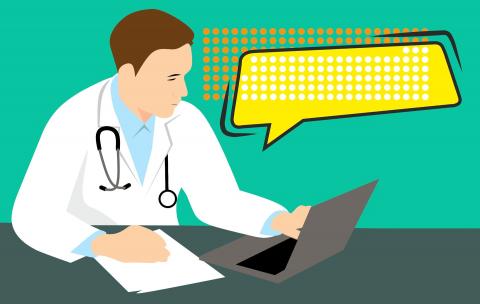
Covid-19: The University's preventive healthcare services stay on watch, at the ready
Since the confinement measures to reduce the spread of Covid-19 were instituted on March 17 by the French President and Université Paris-Saclay closed its doors, many students are living in a state of isolation. Anxious to look after their health in these times of crisis, the University's preventive healthcare services are actively keeping an eye on students, even though it has to be done remotely.
The University Preventive Medicine and Health Promotion Service (SUMPPS) at Université Paris-Saclay has a wide range of healthcare workers, such as doctors, nurses, psychologists, a dietician, a tobacco addiction specialist and a secretary. Their mission: To look after the students' health via medical assessments, GP consultations, psychology consultations, measures to prevent disorders and promote good health, particularly concentrating on general well-being (food, sleep , stress, etc.), sexual health (contraception, STDs, etc) and the consumption of high-risk products (tobacco, alcohol, cannabis, etc.).
Speedy reorganisation
On March 18, an emergency decree was passed to broaden SUMPPS's functions in the widest sense. The Service is now tasked with carrying out health and medical checks on isolated students; that is, students living in public or private university residences, or in private accommodation. On March 26, a letter from Ms. Vidal, Minister of Higher Education and Research reinforced this decree and introduced the possibility of receiving students on campus in exceptional cases. Thus, though the University remains closed, students needing urgent care have access to a health centre from Monday to Friday, in building 452 of the Orsay Vallée campus.
A generic email address (one that existed previously but was linked to the nursing station in building 336) has also been assigned to cover every component of the University's healthcare services, in order to centralise all enquiries concerning student health over the course of this confinement period. Enquiries sent to this address are dealt with by four doctors, working tirelessly from Monday to Sunday, morning to night, assisted by three nurses who provide follow-up care. Three psychologists are also on hand for cases in which psychological help is required. The dietician and the tobacco addiction specialist are running consultation services remotely.
Various partnerships set up to assist students
To meet the healthcare needs of isolated students, it was first necessary to find out what these needs were. Much of this task was carried out via CROUS services.
"Twice a week, I work with my counterpart at CROUS to conduct an assessment of Université Paris-Saclay students living in halls of residence. We also take care of isolated students who are not studying at the University but reside on the university grounds. This partnership with CROUS developed almost instantly, from the very first week of confinement," says Cécile Hallier-Barbe, head of the Preventive Medicine Service for students at Université Paris-Saclay.
A system was also set up to establish close collaboration with the "Disability and Studies" (SHE) unit. This unit compiled a questionnaire for students with disabilities in order to find out about their health condition during this confinement period. 25% of them responded. After receiving the results, the unit acted in coordination with SUMPPS to reach out to these young people. Three nurses from the unit now call them regularly to take stock of their health, while the SHE unit itself continues to keep a watch over all students in its charge.
In the meantime, SUMPPS and SHE are working together on the deployment of interface tools and platforms of the "collaborate" type, in order to organise workshops and foment interaction with students on specific topics. An instrument should become operational in the next few days. It will primarily address sleep disorders and nutrition, two subjects that came out as problem areas in the responses to the SHE questionnaire.
Fine initiatives springing from crisis situations
It hasn't been easy, as Cécile Hallier-Barbe explains: "Healthcare is not something you can provide remotely, so we had to rethink the way we give consultations. The main problem was how to adapt so quickly to such an exceptional situation; and ultimately, how to address the situation by reaching as many students as possible. "
Various initiatives were taken in conjunction with the University's Communication Department, such as an SMS campaign aimed at students. "We noticed that after a mail-out, we get more responses on our generic address. But how can we then maintain this connection, and how can we make sure we pick up on difficult situations? ", Cécile Hallier-Barbe wonders.
Despite the difficulties, the crisis has sparked a great many actions at the brand new Université Paris-Saclay. University and school healthcare services were quick to start working together despite their structural differences. Initiatives such as "Nightline", a listening service provided by students to students, have been set in motion. Moreover, a partnership project between the Nightline association and Université Paris-Saclay is currently under construction, due to become operative at the start of the 2020 academic year.
Some of the SUMPPS doctors and nurses have gone to join other fronts, such as the private sector, the intensive care unit at Bicêtre hospital, the emergency department at Orsay hospital and even nursing homes and shelters. "They've all taken a decision that exposes them to Covid-19, and for that we must honour them. They've found other places that need their help during these difficult times," concludes Cécile Hallier-Barbe.
All the information for contacting the University's medical service.
